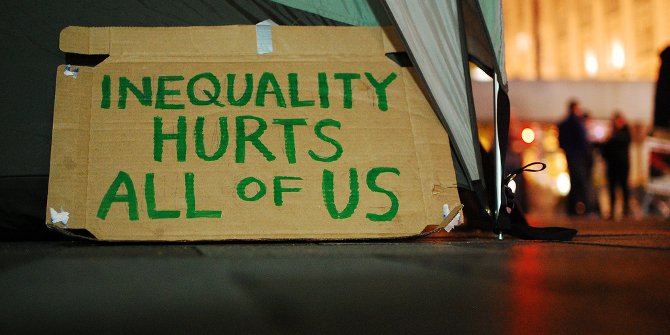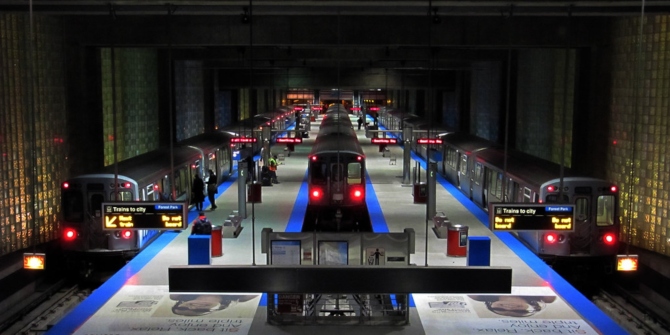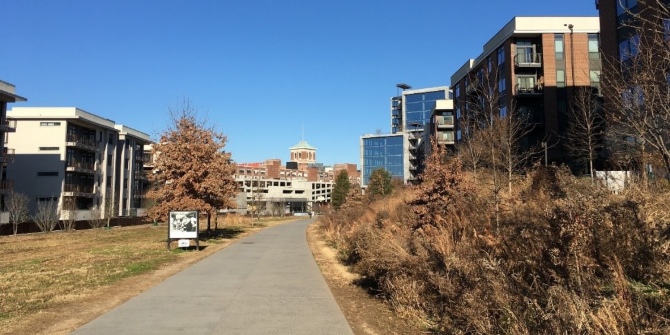 Earlier this month Brandon Johnson was elected as mayor of Chicago, succeeding Lori Lightfoot. Johnson won the election against Paul Vallas who had taken a much harder line on policing and public order. Magic Wade writes that Johnson’s victory may be emblematic of the continuing shift in how Black mayors in the US talk about urban unrest. She writes that while in the past Black mayors had tended to engage in racial distancing and “respectability politics” in their statements following police-involved deaths of Black Americans, the murder of George Floyd in May 2020 signaled a change in these statements’ language towards appeals which are unapologetically Black and pro-urban.
Earlier this month Brandon Johnson was elected as mayor of Chicago, succeeding Lori Lightfoot. Johnson won the election against Paul Vallas who had taken a much harder line on policing and public order. Magic Wade writes that Johnson’s victory may be emblematic of the continuing shift in how Black mayors in the US talk about urban unrest. She writes that while in the past Black mayors had tended to engage in racial distancing and “respectability politics” in their statements following police-involved deaths of Black Americans, the murder of George Floyd in May 2020 signaled a change in these statements’ language towards appeals which are unapologetically Black and pro-urban.
The election of Brandon Johnson to succeed beleaguered Lori Lightfoot as Chicago’s next mayor captivated US audiences earlier this month. With public safety concerns topping Chicagoans’ priorities, vindicated progressives and confounded conservatives are spinning narratives to explain how “defund the police” Johnson defeated his opponent “tough-on-crime” Paul Vallas. However, I suggest Johnson’s victory aligns with a broader trend in urban politics, where Black Democratic mayors have been succeeding in racially diverse, progressive cities without engaging in racial distancing appeals – where politicians signal they will not do anything to change the current racial situation – rooted in the “politics of respectability.” As my research shows, a paradigm shift away from so-called respectability talk has been underway since the summer of 2020. Johnson’s election as Chicago’s next mayor should be viewed as a continuation rather than a departure from this.
The changing response of Black mayors to police-involved deaths of Black Americans
In my latest work, I observe that the murder of George Floyd by Minneapolis Police Officer Derek Chauvin in 2020 resulted in a broader, seemingly more furious public outcry than previous police-involved deaths of Black Americans, such as Michael Brown and Freddie Gray. I examine whether responses of Black mayors to Floyd’s killing were different from elite responses to recent similar incidents. I analyzed the statements of all sitting Black mayors of the 100 largest American cities in response to the killings of Brown, Gray, and Floyd. My findings suggest that Black mayors were less likely to engage in respectability politics and racial distancing when talking about Floyd’s murder and subsequent urban unrest.
First, I confirm that during the Obama administration, mayors frequently engaged in racial distancing by condemning the behavior of a narrow subset of unruly protestors who damaged property during protests. Then, in 2020, Black mayors were significantly less likely to engage in respectability politics. I find evidence of a qualitative shift in the rhetoric of Black mayors across time, with the number of “pro” respectability politics claims espoused in mayoral statements decreasing, even after controlling for variance associated with the non-independence of individual mayors’ statements, as well as the length of statements.
My analysis therefore suggests that the rhetorical shift was characteristic of the population of mayors rather than being driven by a few vocal mayors. In addition, neither key demographic factors of mayors themselves nor major demographics of the cities in which they were elected explained the further variance in rhetoric regarding respectability or change in rhetoric across eras. One strong possibility for the shift in mayoral rhetoric I found is that mayors in 2020 were responding to the tone set by President Donald Trump, who repeatedly referred to protestors as “thugs” and infamously tweeted, “When the looting starts, the shooting starts.” In response, Chicago’s Mayor Lightfoot spoke for roughly 40 minutes during a press conference in which she addressed civil unrest in Minneapolis, Chicago, and other major cities while strongly rebuking Trump’s rhetoric.

Photo by Pedro Lastra on Unsplash
A shifting tone for Black mayors in response to a shifting political climate
My findings suggest that Black mayors were less likely to engage in respectability politics and racial distancing when responding to George Floyd’s murder and subsequent urban unrest. I conjecture that this finding may be due to a shift in the political climate, as well as the tone set by President Trump. Nonetheless, I suggest that political expedience will dictate the conditions under which Black mayors are more or less likely to racially distance in their political appeals. For instance, increases in urban crime, violence, and homelessness have recently compelled Black mayors like Lori Lightfoot, London Breed in San Francisco, and Eric Adams in New York to embrace tougher rhetoric and more punitive policies.
On the other hand, the victories of Black progressives like Karen Bass in Los Angeles and Brandon Johnson in Chicago suggest that racial distancing appeals are being supplanted by a new paradigm that is unapologetically Black and pro-urban. I discuss the implications of my research in light of such observations and consider the potential for big city mayors, moving forward, to embrace Black urban pride as a counterweight to respectability politics. As Brandon Johnson declared during his acceptance speech, which happened to coincide with the 55th anniversary of the assassination of Martin Luther King, Jr., “Today, we did not just acknowledge the assassination of a dreamer…Today, the dream is alive…we celebrate the revival and the resurrection of the city of Chicago.”
- This article is based on the paper, ’Respectability Politics and Black Mayors’ Responses to Police-involved Killings, Protests, and Civil Unrest: Is a Paradigm Shift Underway?’ in the Journal of Race, Ethnicity, and Politics.
- Please read our comments policy before commenting.
- Note: This article gives the views of the author, and not the position of USAPP – American Politics and Policy, nor the London School of Economics.
- Shortened URL for this post: https://bit.ly/3MZkfx8






